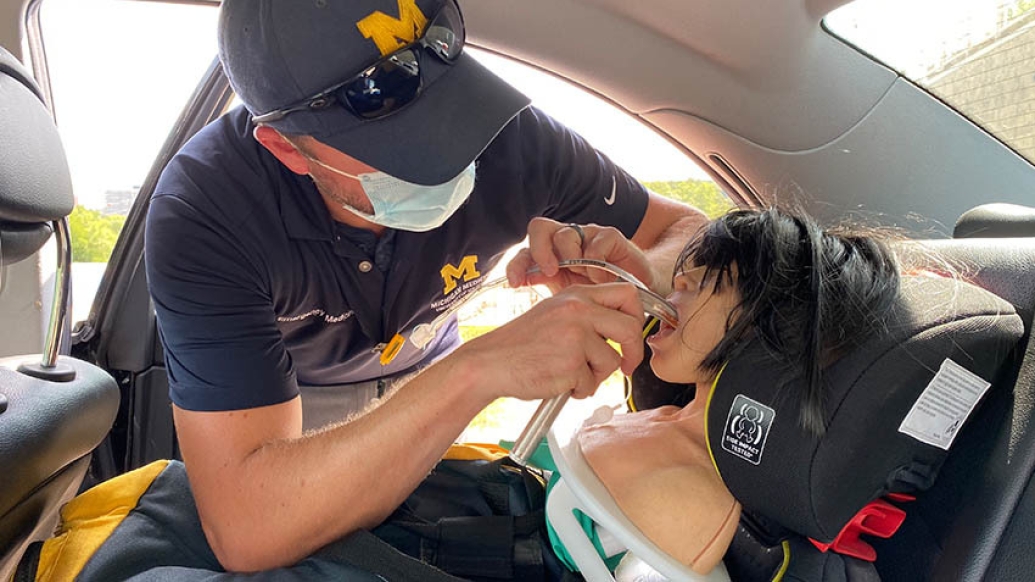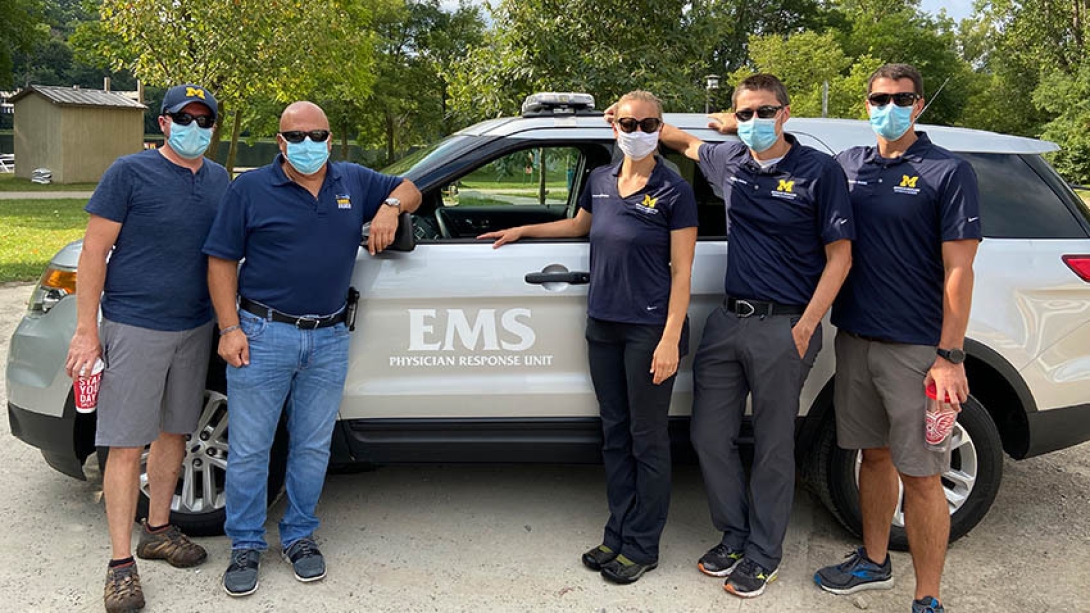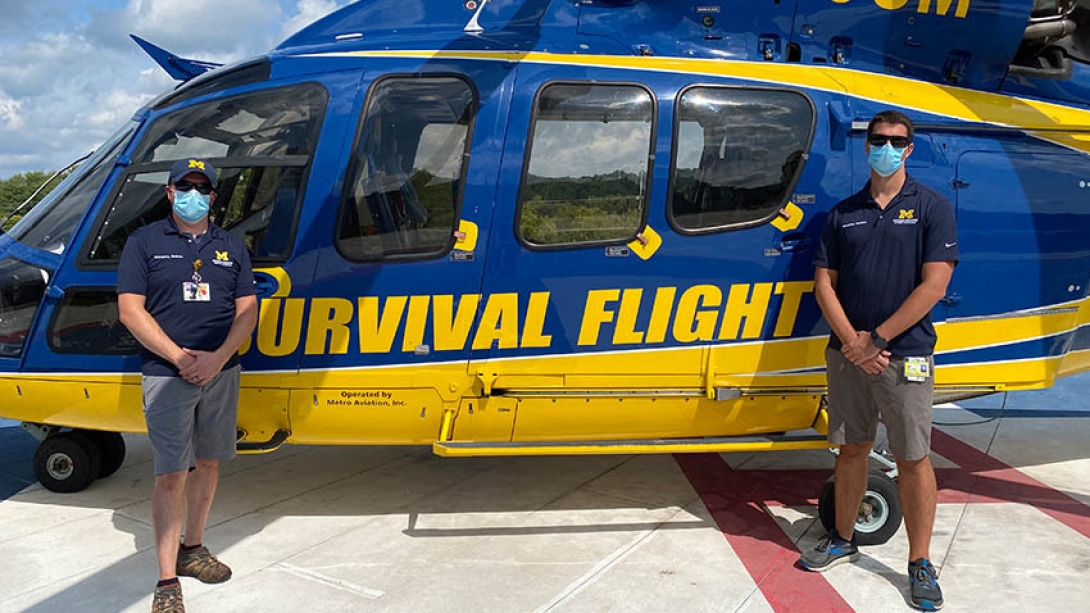The one-year training gives emergency medicine physicians additional education in prehospital medicine.
1:12 PM
Author |

Emergency care is more than just treating a patient in the hospital emergency department.
"A large component of emergency care is not anywhere near an emergency department," says Christine Brent, M.D., FAEMS, an assistant professor of emergency medicine at Michigan Medicine. "Prehospital emergency care includes the care you would traditionally think of provided by teams such as paramedics and first responders, as well as medical planning for mass gatherings and large events, out-of-hospital emergency preparedness and wilderness extrication."
According to Brent, most emergency medicine residencies do not offer adequate training in prehospital care, or care that happens before a patient is brought to the emergency department. This led Brent and her colleagues, Mark Lowell, M.D., and Graham Smith, M.D., to develop the Michigan Medicine Emergency Medical Services Fellowship.
"We wanted to create a fellowship that puts our physicians out in the field for hands-on training in prehospital emergency care," says Brent, who will serve as the director of the fellowship. "In order to do that successfully, we ensured that our partners in EMS, such as our community EMS transport agencies and local fire and police departments, are all involved in the training to give our fellows an outstanding and diverse educational experience. Our goal is to develop future physician leaders in emergency medical services, and we are grateful to have such supportive partners in that endeavor."
The fellowship provides trainees with learning opportunities in the various areas of prehospital emergency care which they may not have been exposed to in the past.
"Over the year-long program, the fellows will have training in the breadth of EMS medicine, including ground EMS, aeromedical EMS, disaster medicine, special operations rescue medicine, research, administrative EMS, wilderness EMS and event medicine," she says.
"As examples, fellows will utilize an EMS physician vehicle to respond directly to 911 calls in the field, as well as provide online medical direction over the phone or radio, resulting in robust training in ground EMS," Brent says. "They will help provide medical education and quality assurance to prehospital providers, and they will serve as flight physicians with Survival Flight to learn about air medical EMS and critical care transport medicine. They will collaborate with event planners to design the medical support for mass gatherings in Ann Arbor, such as football games and road races."
She adds, "Set within the context of administrative oversight of the entire EMS system, the program is designed so that the fellow truly becomes an expert in all facets of prehospital care." Fellows that successfully complete the program become board eligible in EMS medicine.

The fellowship program kicked off this year with its first two fellows, Nathaniel Hunt, M.D., and Spencer Masiewicz, D.O. Here, they explain the unique aspects of the fellowship and how it will help them attain their future goals in emergency medicine care.
Why did the Michigan Medicine EMS Fellowship interest you?
Hunt: I was a paramedic before going to medical school and maintain an interest and passion for prehospital medicine. I knew going into medical school that I was going to do an EMS fellowship. Having the opportunity to train with and learn from our prehospital providers, and to do a little teaching as well, is exciting. We have so many amazing agencies and people that it really is a pleasure to get to know them and work alongside them to serve our population and advance the field.
Masiewicz: I've had a career interest in the EMS world for some time, but the goal of the fellowship for me is to gain the skills and training necessary to become an EMS medical director for a larger metropolitan system. The EMS subspecialty as a whole is relatively new, with board certification becoming available in 2012. Despite being new, it's a rapidly growing field with approximately 70 programs nationwide.
Learning how to interface with EMS from an emergency medicine physician perspective is something inherent to every residency training program, but managing a prehospital system is far different. Prehospital systems are diverse and can vary greatly from city-to-city and more so from state-to-state. This fellowship allots me an extra year of training to focus on and fully explore the EMS world from an oversight perspective, including system design and administration, research, special operations and clinical care.
MORE FROM THE LAB: Subscribe to our weekly newsletter
What would you say is the most unique factor of this fellowship?
Hunt: Our fellowship is brand new so we really have an amazing opportunity to mold and shape the face of this program for years to come. I'd also like to thank all of our fire and police departments and EMS services for the incredibly warm welcome and support we have felt while rolling out this program. We are so excited to partner with these agencies and advance the field for our citizens.
Masiewicz: The most alluring aspect for me is the quality and versatility of the program here at Michigan Medicine. The ability to explore the different facets of EMS at such depth is hard to find and unique.
Survival Flight is a great example and well-known program of prehospital medicine care in Ann Arbor, but there's so much more to it. It's unique to work in programs such as event medicine – college sports games and marathons – where we interact with not just local authorities and EMS agencies, but also federal agencies, such as the U.S. Department of Homeland Security. In special operations medicine we work with the local Tactical Rescue Squad, Hazardous Materials Management Team, also known as HAZMAT, and more. The list can go on and on.

Now that you are a couple of months into the fellowship, what is a typical day like in this program?
Hunt: Our schedule varies pretty dramatically. Some days are local and regional EMS leadership meetings, while other days are filled with flight time with Survival Flight or ground EMS time with Huron Valley Ambulance, Livingston County EMS and our fire and police colleagues. Several times a month we are training with the technical rescue, HAZMAT, dive or tactical teams. We also still work shifts in local emergency departments. It really varies a lot, which is part of the fun, in my opinion.
Masiewicz: One of the most fulfilling qualities about the fellowship program is that every day is different. I love being able to practice medicine outside of the traditional emergency department setting. One day I could be on multiple conference calls for regional and statewide protocol meetings, and the next I could be the physician on flight with the Survival Flight team. There are nearly endless possibilities to what my work week could entail.
What are you hoping to learn over the course of your fellowship?
Hunt: Having previous paramedic and flight experience, I am already very comfortable with the transport side of medicine. I hope to spend much of my time learning the administrative side of things so I can safely and effectively administer a prehospital system. I am really looking forward to learning more about the fire and police services in our areas and to train with our special operations teams.
Masiewicz: My main goals are to learn more about EMS system design and administration, prehospital medicine research, coordination with special operation teams and direct patient clinical care outside of the emergency department.
What is your ultimate career goal and how is this fellowship helping you achieve it?
Hunt: My goal with this fellowship is to gain the training and experience to be a medical director for an EMS system in the future.
Masiewicz: The goal is to become an EMS medical director for a larger metropolitan system. Those positions are becoming increasingly competitive and it's almost required now for academic or metropolitan directors to be fellowship trained. The fellowship training also strengthens my resume and allows me to be a better applicant for positions in an increasingly competitive emergency physician job environment.

Explore a variety of healthcare news & stories by visiting the Health Lab home page for more articles.

Department of Communication at Michigan Medicine
Want top health & research news weekly? Sign up for Health Lab’s newsletters today!





